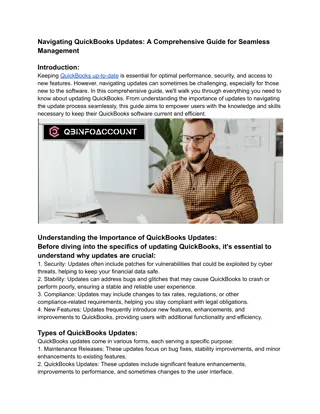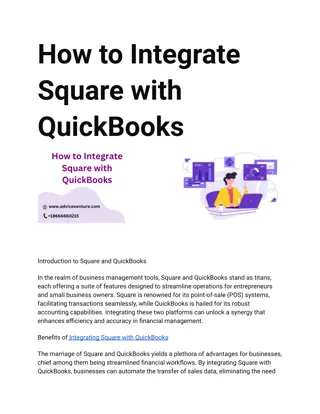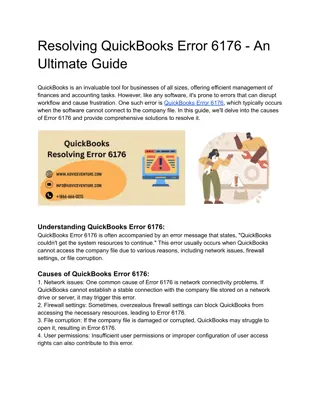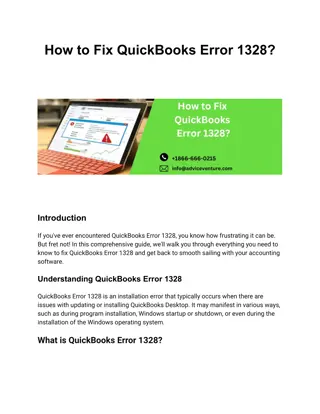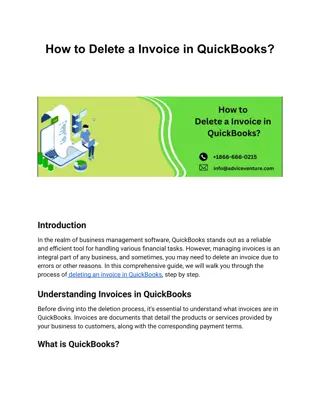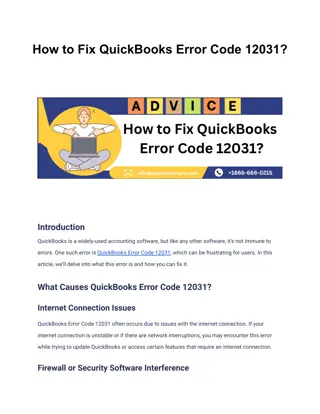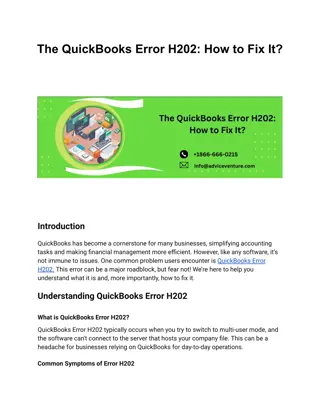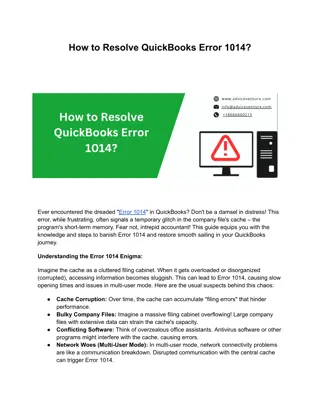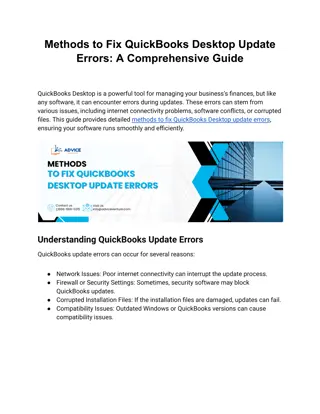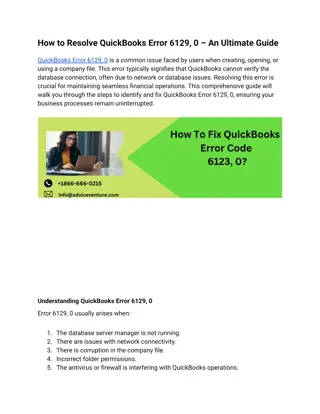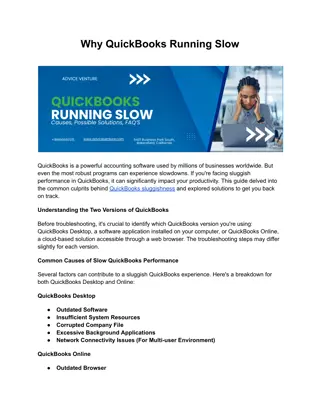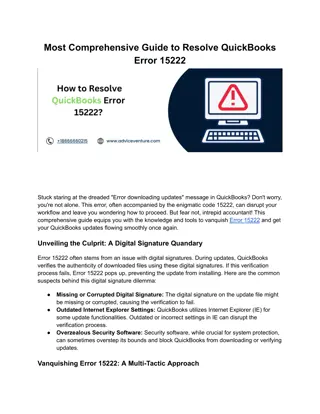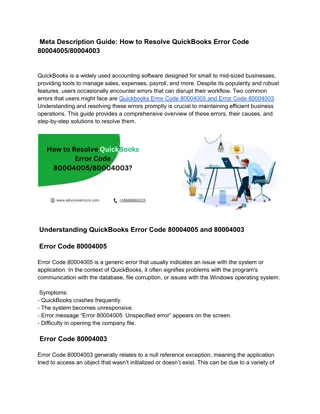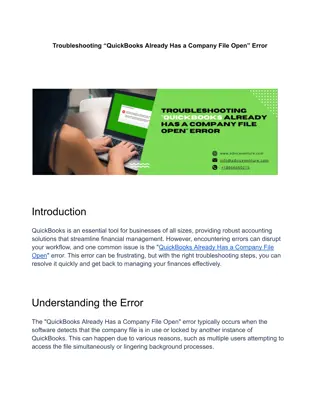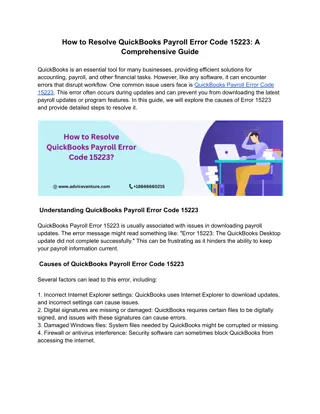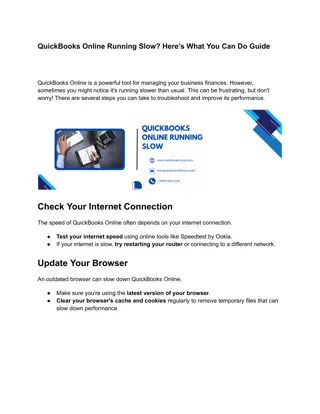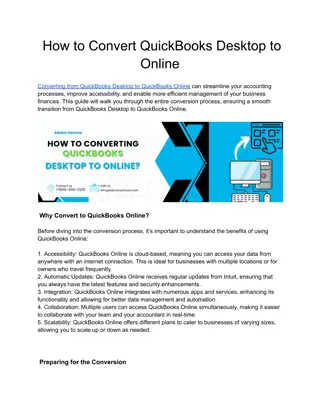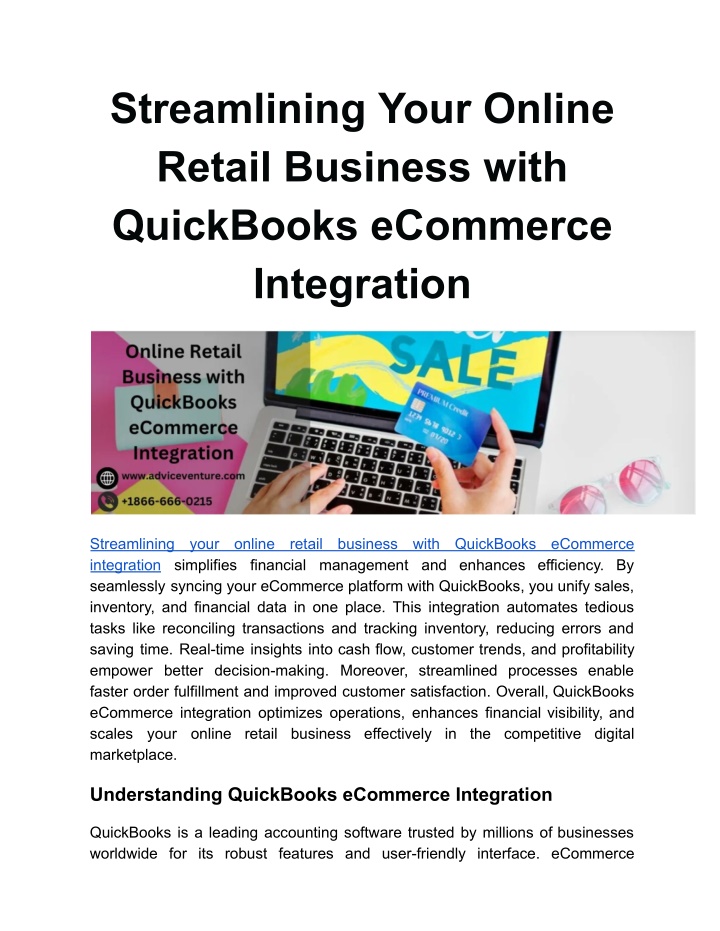
Streamlining Your Online Retail Business with QuickBooks eCommerce Integration
Streamlining your online retail business with QuickBooks eCommerce integration simplifies financial management and enhances efficiency. By seamlessly syncing your eCommerce platform with QuickBooks, you unify sales, inventory, and financial data in one place. This integration automates tedious tasks like reconciling transactions and tracking inventory.
Download Presentation

Please find below an Image/Link to download the presentation.
The content on the website is provided AS IS for your information and personal use only. It may not be sold, licensed, or shared on other websites without obtaining consent from the author. If you encounter any issues during the download, it is possible that the publisher has removed the file from their server.
You are allowed to download the files provided on this website for personal or commercial use, subject to the condition that they are used lawfully. All files are the property of their respective owners.
The content on the website is provided AS IS for your information and personal use only. It may not be sold, licensed, or shared on other websites without obtaining consent from the author.
E N D
Presentation Transcript
Streamlining Your Online Retail Business with QuickBooks eCommerce Integration Streamlining integration simplifies financial management and enhances efficiency. By seamlessly syncing your eCommerce platform with QuickBooks, you unify sales, inventory, and financial data in one place. This integration automates tedious tasks like reconciling transactions and tracking inventory, reducing errors and saving time. Real-time insights into cash flow, customer trends, and profitability empower better decision-making. Moreover, streamlined processes enable faster order fulfillment and improved customer satisfaction. Overall, QuickBooks eCommerce integration optimizes operations, enhances financial visibility, and scales your online retail business effectively in the competitive digital marketplace. your online retail business with QuickBooks eCommerce Understanding QuickBooks eCommerce Integration QuickBooks is a leading accounting software trusted by millions of businesses worldwide for its robust features and user-friendly interface. eCommerce
integration with QuickBooks extends its functionality to online retailers, enabling them to automate and consolidate financial processes seamlessly. Key Benefits of QuickBooks eCommerce Integration: 1. Centralized platform with QuickBooks centralizes financial data in one system. This consolidation eliminates the need for manual data entry and reduces the risk of errors associated with disparate systems. 2. Real-time Data Sync: The integration ensures that sales, orders, and inventory updates are synchronized eCommerce store and QuickBooks. This real-time visibility into financial metrics allows for better decision-making and improved operational efficiency. 3. Efficient Order Management: Automating order management processes through integration streamlines workflows from order placement to fulfillment. QuickBooks can generate invoices, track payments, and reconcile transactions automatically, administrative overhead. 4. Inventory Control and Optimization: Maintaining accurate inventory levels is critical for online retailers to avoid stockouts or overstock situations. QuickBooks eCommerce integration provides insights into inventory movements, helps track stock levels, and facilitates timely replenishment. 5. Enhanced Financial Reporting: capabilities enable online retailers to generate detailed financial reports effortlessly. These reports offer profitability, cash flow, and customer behavior, supporting strategic planning and forecasting. 6. Customer Relationship Management: between your eCommerce platform and QuickBooks enhances customer relationship management (CRM) capabilities. You can track customer transactions, analyze purchasing patterns, and personalize marketing efforts based on real-time insights. Financial Management: Integrating your eCommerce in real-time between your saving time and reducing QuickBooks' robust reporting insights into sales performance, Integrating customer data Implementing QuickBooks eCommerce Integration 1. Choosing the Right eCommerce Platform:
Before integrating with QuickBooks, select an eCommerce platform compatible with QuickBooks or one that offers seamless integration options. Popular eCommerce platforms like Shopify, BigCommerce often have plugins or built-in features for QuickBooks integration. WooCommerce, Magento, and 2. Setting Up Integration: Once you've chosen your eCommerce platform, follow these steps to set up QuickBooks integration: Select Integration Method: Depending on your eCommerce platform, choose the appropriate integration method (API integration, third-party apps, plugins, etc.) that supports QuickBooks integration. Configure Integration Settings: Configure integration settings to sync sales orders, customer data, inventory updates, and financial transactions between your eCommerce store and QuickBooks. Map Data Fields: Ensure proper mapping of data fields between your eCommerce platform and QuickBooks to maintain consistency and accuracy in data synchronization. Test Integration: Conduct thorough testing to verify that data syncs accurately and in real-time between your eCommerce platform and QuickBooks. 3. Customizing Integration for Business Needs: Tailor requirements: QuickBooks eCommerce integration to meet specific business Custom Reports: Create custom reports in QuickBooks to analyze sales trends, profitability by product category, customer demographics, etc. Automated Workflows: Implement automated workflows for order processing, invoicing, payment reconciliation, and inventory management to streamline operations. Tax Compliance: Utilize QuickBooks' tax management features to automate tax calculations, manage sales tax, and ensure compliance with tax regulations. 4. Training and Support: Provide training to your team on using QuickBooks eCommerce integration effectively:
User Training: Educate staff members on how to navigate QuickBooks, generate reports, and utilize integration features to optimize daily operations. Technical Support: Ensure access to technical support resources or engage with QuickBooks-certified integration setup and troubleshooting. consultants for assistance with Case eCommerce Integration Study: Real-world Application of QuickBooks Case Study: XYZ Clothing Co. XYZ Clothing Co., an online apparel retailer, implemented QuickBooks eCommerce integration to streamline its operations and enhance financial management. Challenges Faced: Manual data entry and reconciliation processes were time-consuming and prone to errors. Lack of real-time visibility into inventory levels led to stockouts and delayed order fulfillment. Difficulty in generating accurate financial reports for analysis and decision-making. Solution Implemented: Integrated Shopify, their eCommerce platform, with QuickBooks Online to automate order processing, inventory updates, and financial transactions. Customized integration settings to synchronize sales orders, customer data, and inventory updates in real-time. Implemented automated workflows for invoicing, payment reconciliation, and tax management to streamline operations. Results Achieved: Improved operational efficiency with automated order management and inventory control. Real-time visibility into sales performance, inventory levels, and financial metrics enabled proactive decision-making.
Enhanced financial reporting capabilities facilitated strategic planning and forecasting. Increased customer satisfaction with faster order processing and accurate billing. Future Trends and Considerations 1. Integration with AI and Machine Learning: As AI and machine learning technologies advance, integrating these capabilities with QuickBooks eCommerce integration can enhance predictive analytics, personalized marketing, and inventory forecasting. 2. Mobile Integration: With the increasing reliance on mobile devices, ensuring mobile compatibility and access to QuickBooks eCommerce integration tools will become essential for on-the-go business management. 3. Regulatory Compliance: Stay updated with regulatory changes and ensure QuickBooks integration supports compliance with tax laws, data privacy regulations, and financial reporting standards. 4. Scalability: Choose an eCommerce platform and integration solution that can scale with your business growth. Ensure that QuickBooks integration supports expanding product lines, sales channels, and customer base without compromising performance. Conclusion QuickBooks eCommerce integration offers online retailers a robust solution to streamline operations, optimize financial management, and enhance overall business efficiency. By consolidating sales, inventory, and financial data in one platform, QuickBooks integration eliminates manual processes, reduces errors, and provides real-time insights for informed decision-making. Whether you're a small startup or a growing enterprise, leveraging QuickBooks eCommerce integration can drive operational excellence, improve customer satisfaction, and
position your online retail business for sustainable growth in the competitive digital marketplace. Visit: https://www.adviceventure.com/quickbooks-ecommerce-integration/



